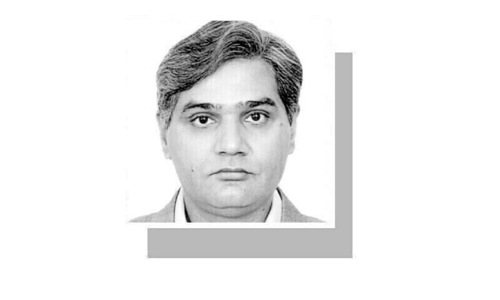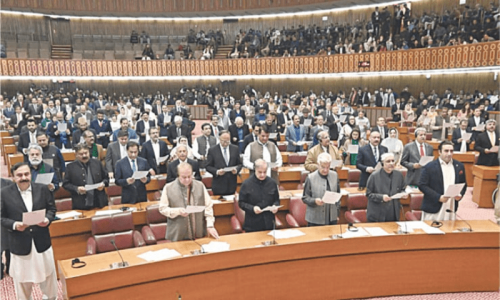PAKISTAN’S foreign policy objectives have been remarkably consistent over the years. They have principally been shaped by its geostrategic location in a tough neighbourhood which imposed heavy security burdens on the country. This explains why security concerns — given Pakistan’s enduring quest for security — had such a dominant influence on the evolution of its foreign policy. The sweep of the country’s foreign policy over the decades also reveals a complex interplay between internal and external factors, and between domestic goals and an ever-changing international environment.
Of course, big power interests in the region had a major impact on policy, intersecting with elite interests to sometimes complicate if not aggravate Pakistan’s challenges. An unedifying aspect of this was a mindset of dependence fostered among officials during prolonged periods of the country’s alignments. This dependence proved to be habit forming. Reliance on external financial assistance — as a consequence of these alignments — created a perverse incentive for urgent economic reform and serious domestic resource mobilisation. It also encouraged ruling elites to constantly look outside to address financial deficits and other sources of internal vulnerabilities, even see outsiders as catalytic agents to promote development and solve problems at home.
Abdul Sattar’s book Pakistan’s Foreign Policy 1947-2019, whose fifth edition has been published this year, does not examine this linkage between the internal and external and how they have been intertwined in such a consequential way. But it offers a useful beginner’s guide to the many twists and turns of foreign policy. Meant primarily for students of international relations, it remains a valuable starting point for anyone interested in learning — in concise form — about the factors driving Pakistan’s external engagements since the country’s inception.
Sattar witnessed first-hand many of the watershed developments in foreign relations during his 39-year career in the foreign service. As foreign secretary he was a participant in several key policy decisions. I had the privilege of working briefly with him in the immediate aftermath of 9/11 when I served as Pakistan’s ambassador to the US and he became foreign minister. I found him anxious to listen to the assessment and advice of the mission — rarely done now — and eager to share his perspectives with our team. His visits to Washington at a challenging time were marked by candid conversations with our interlocuters, often punctuated by a dry wit. He passed away last year, a month after he finished updating his book.
Pakistan came to rely on itself for defence but financial dependence remains a habit.
The central theme of his book is summed up in the foreword by a towering figure in Pakistani diplomacy, Agha Shahi. The “tyranny of power disparity” in the region was brought painfully home when the country was unable by its efforts and those of the UN to achieve the settlement of disputes after independence. To address this situation, Shahi writes, Pakistan “began to look outward for friends and allies” to “safeguard its independence, strengthen security and build the economic sinews of the infant state”. The need to address this power asymmetry tyranny drove Pakistan into alliances during the Cold War and beyond.
This led, until the Cold War ended, to a prolonged pursuit of a strategy of external balancing though Sattar does not use this expression to describe Pakistan’s search for alliances. The cost of alignment with Washington was high, he asserts, and second thoughts arose on the wisdom of this policy, but Pakistan couldn’t afford to abandon this course aimed as it was to “contain the Indian threat in which the US had little interest”. But in those early Cold War years, Pakistan, by abjuring a non-aligned policy, lost the support of influential Arab nations and found itself isolated among African-Asian countries.
Meanwhile, Pakistan sought to engage the US, when it became America’s most allied ally, in efforts to promote a settlement of Kashmir. These attempts were blocked by an intransigent India and its Cold War ally. In 1962, when the Security Council took up the Kashmir issue, India’s foreign minister Krishna Menon reneged on New Delhi’s commitment to hold a plebiscite. The US president then persuaded his Irish counterpart whose country held the Council presidency to sponsor a resolution recalling past resolutions that called for a plebiscite. Despite support from seven members the resolution was vetoed by the Soviet Union.
In reviewing the history of Pakistan’s foreign engagements Sattar identifies a number of turning points. The first was alliance with Washington and turning away from non-alignment, “dictated by the necessity of containing the tyranny of power-disparity”. The second was the growing strategic relationship with China and end of the alliance with the US when it failed to help Pakistan in the 1965 war. The third was the post-1965 turning to the East and distancing from the West. The next turning point came with the 1971 debacle and the lesson Pakistan drew, which dictated the pursuit of the nuclear option. The Soviet invasion of Afghanistan in 1979 marked another turning point which led to Pakistan’s long involvement as well as resumption of the alliance with Washington. This ended with the Soviet exit from Afghanistan. Then came the turning point after 9/11 when Pakistan “was dragged into partnership in the war on terror”, which Sattar argues “brought more problems than benefits”.
The most recent turning point that Sattar did not live to write about has seen Pakistan tie its strategic future more firmly to China while facing an implacably hostile India that has sought to illegally change the status quo in occupied Kashmir. In fact, the country’s daunting foreign policy challenges in the present phase call for a more imaginative strategy to navigate a more complex and unsettled multipolar world.
The world has changed fundamentally but habits ingrained over the years by the ruling elite have yet to do so. Pakistan learnt to rely on itself for its defence when it pursued and acquired the strategic capability to deter aggression. But the habit persists of seeking help from foreign donors to deal with chronic financing gaps — frequently dramatised by frantic trips to Arab capitals. A similar lesson has yet to be learnt about financial self-reliance which is only possible through bold fiscal reform and a reordering of budget priorities. The tyranny of dependence waits to be overcome.
The writer is a former ambassador to the US, UK and UN.
Published in Dawn, June 29th, 2020















































